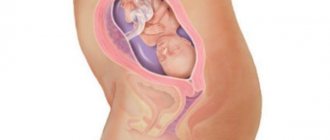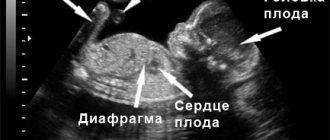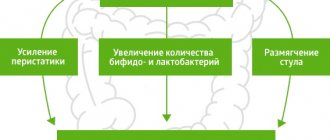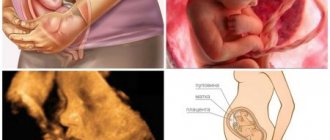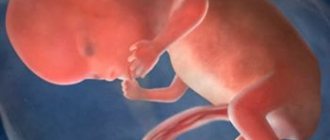Fruit (development, size)
The third month of pregnancy begins. The fetus is only 7 weeks old, but it has already grown tremendously during this time: its coccygeal-parietal size reaches 22-30 mm, and its weight is about 2 g. The embryo continues to straighten, and soon it will get rid of its tail. Now it looks like a small pea pod. And I can’t even believe that such complex processes take place in it!
The brain, nervous system, and some internal organs have already been formed, but development does not stop for a second! At the 9th week of pregnancy, the fetus already notifies the mother of its needs: special signals are received from the tiny brain to the mother’s body. Scientists believe that a woman feels them through sudden changes in food preferences.
The 9th week of pregnancy is the next stage in the formation of vital mechanisms. Now the cerebellum is being formed (coordination will be controlled here), the pituitary gland (the first hormones will be produced here), the middle layer of the adrenal glands (adrenaline will be produced here), as well as the lymph nodes (lymph cells are formed here). The mammary glands begin to develop and the genital organs begin to form. The heart and central nervous system are already working, but their improvement does not stop: cranial, intervertebral and spinal nerves are formed this week. The shoulders and forearms have already emerged, the limbs move and can bend, they continue to lengthen and improve: the foot is growing, the fingers are increasingly separated, the rudiments of the marigolds are visible, which are now still located on the inside - on the palms and soles.
The baby gradually develops muscles, and the bones gradually become stronger. The head is still too large in relation to the body, but the face is improving all the time: the eyes are getting closer, they are closed by eyelids, which will not begin to open soon. The mouth lengthens and acquires more expressive features: corners and folds are formed, the baby can wrinkle his lips and even knows how to swallow. At week 9, the future neck is already visible.
Another achievement is the ability to urinate. The embryo excretes waste products through the umbilical cord into your body, so the load on your kidneys will increase all the time. At week 9, the umbilical cord becomes even longer and denser, and the placenta is already beginning to function, although it will take over the full functions of the corpus luteum only after a few weeks.
Ultrasound photo 9 weeks pregnant
Pregnancy 9 weeks what happens to mom
You are changing, your hormonal levels are changing, the structure of the glands and internal organs is changing, and these changes are still noticeable for the most part only to you: your weight is changing, and sometimes not in the direction of increase, your breasts are getting larger. Minor problems with the skin and veins may begin as the volume of blood pumped by the heart and veins increases by about 25%. In order for such a volume of blood to circulate freely in the body, the walls of the veins stretch a little and become looser. To help your blood vessels contract better and not stretch more than necessary, you should take a number of measures: do not stand for a long time, and when you lie down, if possible, put your feet on a pillow or a rolled blanket, refuse to cross your legs, do not carry weights, do evening contrast shower your legs and find yourself some good compression tights for pregnant women.
The uterus at this stage undergoes slight stretching. Now is the time to purchase a good cream to prevent the appearance of stretch marks, containing sufficient amounts of vitamins A and E.
Noticeably enlarging breasts also require your attention. Do not skimp on breast cream; a good cream will moisturize the skin as much as possible, increasing its ability to stretch.
Feelings at 9 weeks of pregnancy
The woman feels all these changes on herself. Mainly, she begins to go to the toilet more often in small ways: her kidneys are now working for two. At 9 weeks of pregnancy, appetite may disappear completely or increase with a vengeance. Bizarre food preferences surprise not only her family, but also the woman herself: she has never eaten strawberry ice cream with cucumber pickle!
I still really want to sleep! You feel tired, you may feel dizzy and even faint, sometimes you feel like you are running out of air. The body began to accumulate fat reserves to feed the child. This means that you don’t need to go on a diet, but think about looser clothes that won’t squeeze your stomach and cause you discomfort. Choose clothes only from natural fabrics, be sure to buy yourself a comfortable bra that will not squeeze your chest. The breasts, by the way, continue to please your dad - they are growing all the time. The nipples are hypersensitive to irritants and may darken, and sometimes the venous network on the chest is visible.
A woman may suffer from insomnia, but by this time she should try to develop an optimal daily routine, including mandatory walks in the fresh air and rest.
Of course, not all pregnant women are doomed to such inconveniences: many experience the 9th week of pregnancy absolutely comfortably, without any “side effects”.
What's happening
The 9th week of pregnancy is characterized by an increase in uteroplacental blood flow, which ensures the normal development of the fetus. At this stage, the head of the unborn child is rounded and already resembles the head of an adult. The pituitary gland begins to form - a brain appendage that is responsible for the release of hormones that stimulate metabolism, growth and the reproductive system.
At 9 weeks of pregnancy, arms and legs develop rapidly, with the upper limbs still outpacing the lower limbs in growth. Seals appear at the ends of the fingers, from which marigolds will later form. Now they are located on the side of the feet and palms, but will gradually move to their permanent place.
At the 9th week of pregnancy, the face continues to improve: the eyes are fully formed, but until the 27th week they will be covered by eyelids, and already now you can distinguish the nose, mouth and earlobes. Your baby has learned to swallow, wrinkle his lips, cover his face with his hands, and even suck his thumb.
At 8–9 weeks of pregnancy, the formation of the kidneys, adrenal glands and ureters ends, the development of the nervous system continues: spinal and cranial nerves and nerve nodes are formed.
The back gradually straightens, the “tail” turns into a tailbone, the volume of the chest and abdominal cavities increases, which is why the heart no longer sticks out like a tubercle.
Your baby is still very tiny and spends most of his time sleeping. The weight of the fetus is about 2 g, and the height by the end of the 9th week of pregnancy will be 22 - 30 mm. It is not yet possible to determine whether it is a boy or a girl: the external genitalia are very small and will not be visible for several more weeks.
Pain
The 9th week of pregnancy can be accompanied by various pain sensations. Most often, they indicate a possible threat of miscarriage. We are talking about severe cramping pain in the lower abdomen, which radiates to the lower back and may be accompanied by brown or even red bloody discharge. In this case, it is necessary to take measures to maintain the pregnancy.
If abdominal pain at 9 weeks of pregnancy is associated with the intestines, then you can take a No-shpa tablet, having first agreed with your doctor.
Pain in the back or sacrum may be due to compression of the sciatic nerve by the uterus. If they get worse, your doctor may recommend wearing a bandage. Pain in the area of the symphysis pubis can be a symptom of symphysitis, so you should definitely tell your doctor about it.
Bleeding
Pain in the lower abdomen and lower back can result in bleeding at 9 weeks of pregnancy. In this case, there is no way to hesitate: lie down and call an ambulance, and if possible, immediately go to the hospital yourself. Bleeding should be considered the release of blood in any amount. At the 9th week of pregnancy, menstruation no longer occurs, although there is a medical term for “fetal ablution” - a condition in which menstrual-like bleeding occurs despite the pregnancy developing in the body. But in this case, you would hardly already know that life had arisen inside you.
Bleeding at 9 weeks of pregnancy may be a sign of cervical erosion or some kind of neoplasm. In this case, the nagging cramping pain in the lower abdomen will be absent. But still, the doctor must determine the cause.
9 week pregnancy video
9 week pregnancy photo
What happens to mother and baby
At the 9th obstetric week, most women unexpectedly become prettier. This happens because the body begins to accumulate some reserves for the upcoming cycle, and although the belly has not yet appeared because certain transformations have not occurred, the woman becomes a little rounder, her skin becomes smooth and shiny. During this period, some pregnant women already feel that their previous clothes are tight in some places or are difficult to fasten, and this is a consequence of the hormonal changes that occur in the body. The work of vital internal organs becomes more intense, the liver, kidneys, heart and lungs work in an enhanced mode, and this is explained by the same rearranged hormonal levels, during which the volume of distilled blood has increased, which supplies the fetus with oxygen and essential nutrients.
The reserves of fatty tissue deposited near the internal organs will be necessary for breastfeeding, and the body intensively prepares them, obeying the commands of pregnancy hormones. At the same time, the negative components of the pregnancy process begin to appear and intensify; some women begin to:
- varicose veins in the legs and pelvis;
- exacerbation of hemorrhoids;
- problems with the spine and lower back:
- severe manifestations of toxicosis;
- intestinal problems and constipation;
- decreased hemoglobin, which can lead to anemia.
During this period, the size of the uterus on ultrasound is equal to an average grapefruit, the breasts fill out and increase in size. The size and pigmentation of the parapapillary halos change, and hormones predominate in the blood at 9 obstetric weeks - both human chorionic gonadotropin and new sex hormones, the synthesis of which began after fertilization.
Since the growth of the placenta has not yet finished, at week 9 there are still manifestations of toxicosis in the form of nausea and vomiting, hypersensitivity to olfactory stimuli, rejection of certain types of food, and addiction to others, often not particularly liked in the previous state.
The intensive growth of the placenta, as it forms, has a beneficial effect on the processes in the woman’s body, and reduces the risk of miscarriage, fetal rejection, or frozen pregnancy. The placenta also begins to fulfill its tasks of providing nutrition to the baby and supporting the gestation process.
Decreased activity, drowsiness and rapid fatigue of a pregnant woman during this period are explained by intense changes in the body, which consume basic energy reserves, and general changes for this period can be reduced to several points:
- an increase in human chorionic gonadotropin (hCG, responsible at this stage for the normal course of pregnancy);
- growth of the uterus and changes in its size;
- pain in the mammary glands, as a result of gradual preparation for lactation;
- sore nipples and parapapillary halos;
- relative stabilization of the urge to urinate;
- intensification of the work of internal organs;
- 40% increase in circulating blood volume;
- accumulation of lipid layer;
- a gradual decrease in the manifestations of toxicosis, which may now be accompanied by dizziness
An attentive or professional look can find external manifestations in a woman’s body, in the form of a bluish venous network on the chest (this, like painful sensations in the glands, is explained by the activity of prolactin, the hormone responsible for lactation), slight discharge from the nipples, and swelling of the lower extremities and external genitalia. The breasts sometimes become so large that stretch marks may appear on them.
Discharge at 9 weeks of pregnancy
We've dealt with bloody discharge, now let's talk about leucorrhoea. They may change their character somewhat. Heavy mucous discharge in the first trimester is quite normal. They thicken due to increased levels of progesterone to protect the embryo from infection. From the second trimester, estrogen becomes more active, and the discharge takes on a thin, watery consistency.
The leucorrhoea may be clear or whitish (like raw egg white). Normally, they do not smell of anything, do not cause discomfort (itching, burning, redness, swelling in the genital area) and should not change their color. Strong-smelling discharge or discharge of a different color or consistency (yellow, green, gray, brown, red, as well as curdled or bubbly) should be a reason to consult a doctor and undergo a smear to detect infections.
Temperature
An elevated body temperature may also indicate the course of the infection. But if there are no such signs, and the low-grade fever persists and does not fall, then do not rush to panic: for pregnant women, this condition is normal.
If, in addition to temperature, you observe other “bad” symptoms (pain, for example), then your therapist or gynecologist will help you find the cause of the high temperature.
Cold
Fever with cough, sore throat, chills and runny nose are a clear sign of a cold or flu. Remember that treatment is now prohibited, but you still need to alleviate the condition somehow. A sore throat can be treated with warm milk with figs or butter (do not use borscht with honey, as this is a highly allergenic product). Gargling and nasal rinsing (Rotokan, salt, soda) are also suitable. Cranberry and lingonberry fruit drinks are very good - they are tasty, healthy, and will lower the temperature. Up to 38C, no antipyretics, and if it is higher and bad, you can use Paracetamol, but not Analgin. And bed rest - you need to rest for a cold.
Nutrition
At 9 weeks of pregnancy, the baby should receive all the necessary substances: fats, proteins and carbohydrates. But there is a big difference between them, and this should be taken into account when creating your menu. Give preference to complex carbohydrates, trying not to indulge in sweets or replace them with healthy ones - dried fruits, for example. It is better to eat boiled and lean meat, cooked in a gentle way. Try to regularly eat beef and fish (be careful here, since overseas delicacies are very allergenic and may generally be of questionable quality).
If you are very tired and constantly want to sleep, then you should increase the amount of protein and iron in your menu.
Every day, the expectant mother's diet should include fresh natural vegetables and fruits. Choose fruits that are in season, homemade, but always remember about allergenicity: many of them can trigger the development of allergies in an unborn child. However, you shouldn’t abuse any of them.
Body changes and new sensations for women
An expectant mother at 9 weeks pregnant may feel overwhelmed. And there seems to be little work, but still no strength... This is due to the fact that her body, which is now working in an enhanced mode, needs more energy to maintain vital organs and systems. In addition, increased fatigue is often caused by a lack of iron in the body (anemia during pregnancy). It is clear that a pregnant woman needs several times more iron - she not only uses it herself, but also provides it to her child, whom she carries under her heart. A lot of iron also goes into “building” the placenta. Be sure to tell your doctor about your condition - he will prescribe you the necessary multivitamin complexes. Anemia, not corrected in time in the early stages, reaches its peak in the second half of the “interesting situation”, which leads to hypoxia (oxygen starvation) and delayed development of the baby.
Alcohol
Alcohol should be completely avoided during the 9th week of pregnancy. The baby is entirely dependent on you and feeds exclusively on substances that come to him from your body. Alcohol passes through the placenta in the same amount that was taken by the mother. Therefore, even the smallest doses can be fatal for a child. And it is not at all necessary that the consequences of drinking appear immediately. Doctors do not even prescribe alcohol-containing drops to women during this period. But the choice is always yours.
Sex at 9 weeks pregnant
But you can fully enjoy intimacy with your spouse. The tummy is still practically invisible - it will neither embarrass you nor disturb you. And libido at 9 weeks of pregnancy can jump noticeably, and it’s a sin not to take advantage of this.
Sex at 9 weeks is not contraindicated, but with one caveat: if there is no threat of miscarriage. Otherwise you will have to be patient a little.
Intimate life
Intimate life during the 9th week of pregnancy for young spouses is not contraindicated from a medical point of view if the child is pregnant in a healthy and normal manner. However, if doctors inform the expectant mother about the threat of miscarriage, it is better to refrain from having sex now. Remember that you don’t need to completely exclude physical activity from your life. But they must be moderate. Physical activity, including sex, improves blood circulation in the body, saturates it with oxygen and improves the psycho-emotional mood of a pregnant girl.
Analyzes
Most likely, you have already registered and started taking the necessary tests. In this case, their results should come soon. And if you are just about to undergo an examination, then be prepared, because you will have to visit laboratories and doctors a bit.
When registering, your gynecologist will refer you to a number of mandatory tests: a general urine and blood test, a blood test for coagulation, blood type and Rh factor, sexually transmitted diseases, antibodies to hepatitis. It will be necessary to submit stool to determine worms and a vaginal smear to determine infections. When registering, a woman must undergo an examination by a therapist, ophthalmologist, dentist and cardiologist. The child’s father will also take part in visits to the offices: he needs to undergo fluorography and donate blood from a vein to determine the Rh factor.
According to indications, additional hormone tests may be prescribed - they will help assess the development of the child and make predictions about the development of pregnancy. The hCG level at 9 weeks of pregnancy (or 7 weeks from conception) reaches its peak and can range from 20,000 to 200,000 mU/ml and even higher. Underestimated indicators can be a sign of embryo development disorders, overestimated indicators indicate a multiple pregnancy, negative Rh and can also be a warning of defects in the development of the fetus.
The level of progesterone in the blood at the 9th week of pregnancy is also of important diagnostic significance. This hormone contributes to the preservation and successful development of pregnancy, so low levels can be a warning about the possible threat of miscarriage.
What can be seen on an ultrasound
The ninth week is the period of formation of the fetal facial bones, fingers and toes. The baby is still very small; its weight varies from 1.5 to 2 g. The size of the fetus does not exceed 30 mm. He has already left the embryonic stage, since the period of embryonic development has come to an end. During the diagnosis, the ninth week allows you to listen to the fetal heart beat and see its first movements. Although the expectant mother cannot yet feel the baby’s movements.
Ultrasound readings at 12 weeks of pregnancy
His heart rate is between 150 and 170 beats per minute. At this time it is impossible to determine the sex of the child. Although the formation of external genital organs is already taking place. His skeleton becomes denser and cartilaginous tissue is formed.
Some parts of the brain, hair follicles, digestive system, and anus are being formed. The development of the nervous system and muscles begins. During the procedure, the doctor measures the size of the fetus, the ovum in which the baby is located, assesses the rhythm of contractions, the frequency with which the heart beats.
At this stage, it is possible to determine the presence of a multiple pregnancy. Great importance is paid to the condition of the uterus, its thickness is measured. Increased parameters indicate a risk of miscarriage. The cervix, the degree of closure of the cervical canal, and monitoring of tissue homogeneity, location and size of the ovaries are also assessed. The data obtained during the study is transferred to the woman’s hands.
Ultrasound at 9 weeks of pregnancy
The doctor may also refer you for an ultrasound at 9 weeks of pregnancy to assess the condition of the fetus and uterus, more accurately determine the gestational age and make predictions for the future.
An ultrasound at week 9 will already show how the small heart beats: at this time it makes 130-150 beats per minute, driving blood through the blood vessels of its entire body.
An ultrasound examination will also evaluate the motor activity of the embryo: the baby is already bending and unbending his arms, moving his legs, although the mother will feel these movements only at 4-5 months of pregnancy.
Embryo development at 9 weeks
The weight of the fruit is about 4 grams, and the length of the fruit is from 22 to 30 mm.
At this stage, the embryo begins to develop more actively its arms, and it is also the turn of the lower extremities (legs) to improve. All joints in the legs develop. The fingers and toes of the embryo, which were previously united by a membrane, gradually become separated. Now the embryo has the opportunity to move its arms and legs freely.
The baby from time to time brings his hands to his face, trying to bend and straighten them. In addition, he trains to straighten his legs at the knee joints. The head of the embryo is no longer so elongated. Having become noticeably rounder, it begins to take on a human appearance, but at the same time continues to remain disproportionately large. Its diameter is approximately 1.35–1.38 with a body length of 3.60–3.66 cm. The face of the embryo has now acquired a human appearance. The size of the eyes, of course, is still very large for a small person, but they are already framed by eyelids. The embryo's ears are still slightly lower than desired.
At 9 weeks the baby begins to lose his tail. And most importantly, by this time the first signs of a sucking reflex appear. The baby's heart at 9 weeks of pregnancy is a muscle consisting of the right and left atria and ventricle. The blood of the embryo is enriched with red blood cells.
The embryo's digestive system also undergoes some changes. So, for example, the structure of the baby’s liver and pancreas is gradually modified. And new sections are formed in the intestines. The baby's respiratory system is also actively developing. The trachea, which was only in an embryonic state, begins to branch, forming bronchi.
Active growth and development of the embryo is accompanied by danger. Since week 9 enters the critical period of fetal development. We talked about why this happens in this article.
Until week 9, the embryo had a so-called primary kidney, but now it is transformed into real (secondary) kidneys. Thus, both the ureters and the adrenal glands begin to develop. By the way, if you perform an ultrasound on a woman at 9 weeks of pregnancy, the doctor can easily determine whether the baby is sleeping or awake.
